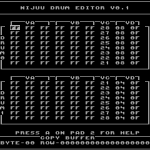By Peter Swimm, on June 12th, 2009  Behind the scenes of “the Jungle Book” Behind the scenes of “the Jungle Book”
We’re coming towards the end of my NES music ‘nesography’ and I had a decision to make as to which game to do next. I’ll explain. By the end of 1992, Eurocom had expanded and diversified and we started working on Gameboy, Master System, PC & 3D0. We were approached by Virgin Interactive who had a Jungle Book game in development on Genesis/Megadrive but things weren’t going well and they were looking for an external team to take over the project and get it finished. Not having much to lose and because we saw it as a good opportunity to springboard onto the then new 16-bit platforms (Genesis/Megadrive and SNES – although we didn’t actually do the SNES version of this game) we jumped in with both feet. On the back of successfully finishing the project we had a 16-bit feather in our caps and were able to expand the company and move forward. It was a turning point for Eurocom – a real make-or-break moment.
And the release of NIIJU Drum Editor:
There are two drum sounds, DRUM0 and DRUM1 (just a limitation of the editor, you can have as many as you like inside Nijuu). The screen is split into two tables, the top one is for DRUM0 and the bottom for DRUM1. Going across the tables you have 3 values for Voice A “VA”, 3 values for Voice B “VB”, only one value for Voice C “VC” and two values for Voice D “VD”. Each drum sound lasts for 8 frames, each row of the table represents a frame and goes from top to bottom. At the bottom of the screen is a box that shows you what is currently in the copy buffer and also a message to remind you that you can access the (basic) help screen by pressing A on pad number 2…
via.
By Peter Swimm, on May 18th, 2009 [kml_flashembed movie="http://www.youtube.com/v/BGr55cAnmmw" width="425" height="344" allowfullscreen="true" fvars="fs=1" /]
Tiny Cartridge has news of the US release of PictoBit: The second-best DSiWare game, Art Style: PiCOPiCT (right under Art Style: Hacolife), is finally available in North America as PiCTOBiTS. It is imperative that you purchase this addictive puzzler, if nothing more than for its YMCK remixes of classic NES/Famicom songs:
“Super Mario Bros. Part 5” by YMCK
“Super Mario Bros. Part 4” by YMCK
PiCOPiCT’s “Ending” (Credits) song by YMCK
Make sure to read my PiCOPiCT review, too.
And a positive review of Reformat the Planet. In other bits:
- Neil Baldwin has updated his Duty Cycle Generator blog, this time with background and audio of the game Ferrari Grand Prix.
- Little-Scale has provided a new “Chip Tune Music Uploader” the idea is to avoid ugly media fire or similar download sites. But seriously kids, get a website!
- Finally, VORC has upped a new demo video of 8-Bit Prophet
By B00daW, on May 8th, 2009 Neil Baldwin, chip music composer and director at Eurocom, dropped in for a Q&A session in #NESdev@EFnet last night for a few hours; hosted by yours truly Sean W. (a.k.a. B00daW.) A lot of people, including Neil and I, were getting a bit “loose” to unwind during the event. So to protect the innocent, the transcriptions below are selectively abridged.
The evening started out with everyone discussing the differences between today’s assemblers and those of yesterday. Assemblers are the programs that translate the assembly code to hexadecimal; the output being called “binary form” or “a binary.” Paraphrasing what Neil had said regarding this:
“We actually wrote our own assembler eventually. We used it on NES and then later we added SNES support. [The company at that point consisting of 5 people in the early 1990’s.] We had no interactive debuggers, etc.; but it was a rudimentary IDE in as much as it was an editor with a built in assembler/disassembler. I actually got [the old environment] compiling; but had to use DOSBox as it wouldn’t work in anything else.”
I had asked the question if the environment would ever be available to the public to which he responded that it would have to be brought up with the other directors at Eurocom. Perhaps we’ll get to see some of the old techniques used. Time will tell.
Continue reading Neil Baldwin #NESdev Q&A Session
By Peter Swimm, on May 4th, 2009 I’d done quite a heavy testing and debugging session and didn’t actually mean to write any “music” but the test patterns I was playing with suggested something and I got a bit carried away. It’s a bit of nonesense really but it shows off quite a few features of Nijuu, including portamento, modifying instrument parameters on the fly, echo effects (all done via my new echo effect command, nothing is manually entered like in the old days), gated amplitude (via user-definable patterns), new drums and four square-wave voices. Yes, four ;)
via Duty Cycle Generator – NES Music by Neil Baldwin.
If this is just a throw away demo, its VERY impressive. Hang in there towards the end it gets heavy and psychedelic.
nijuu-testnsf
By Peter Swimm, on April 23rd, 2009 Via an update on the essential Duty Cycle Generator blog, Neil Baldwin writes about news of his new NES sound driver. Sounds Drool!
I figured I could take the best bits of my old sound driver, improve the stuff that didn’t work properly, throw in some of the flexibility from MML/PPMCK and make my ultimate NES audio driver. So over the last few weeks I’ve actually written a brand new NES driver, from scratch, which I’ve nicknamed ‘Nijuu’
Gory tech details at his blog. Sounds great!
|
|
 Behind the scenes of “the Jungle Book”
Behind the scenes of “the Jungle Book”
Comments